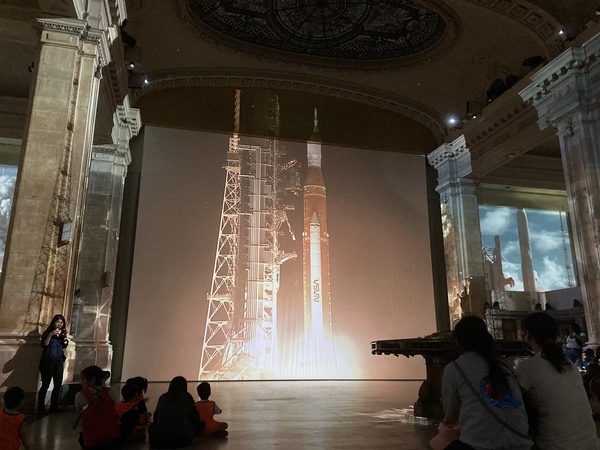
Review: Destination Cosmosby Jeff Foust
|
| At times, such as views of the Sun, or from the surface of Mars, does it seem like it truly places you on a planetary surface or near the Sun. |
The exhibition, subtitled “The Immersive Space Experience,” starts with images of spaceflight, including the recent Artemis 1 launch. It then goes put into space, looking back at the Earth before hopscotching through the solar system, touring the Sun and Mars and then the outer planets, before concluding with some images of more distant cosmic objects.
The exhibition only sometimes lives up to the immersive experience promised in its title. At times, such as views of the Sun, or from the surface of Mars, does it seem like it truly places you on a planetary surface or near the Sun. Other times the images are simply repeated, trading immersion for a hall of mirrors. The exhibition is on roughly a 45-minute loop, with no narration but instead a soundtrack that ranges from classical to classic rock. It can be relaxing enough at times to offer that moment of zen.
At least until the school groups show up. During a visit late on a Friday morning, several groups of elementary or preschool-aged kids arrived; from their chatter it wasn’t clear if they were wowed by the experience or simply happy to be out of the classroom. Fortunately, there was an escape: a lower level that features the same presentation, but in a smaller space with beanbag chairs. The bank’s vault, also on that lower level, has been converted into an even more intimate space to view the same images.
 The Artemis 1 launch gets a brief appearance in “Destination Cosmos”. (credit: J. Foust) |
“Destination Cosmos” is only superficially educational: there is a bit of explanatory text in some of the images. But that text lists Voyager 2 of having a mission to explore Uranus and Neptune, ignoring its earlier flybys of Jupiter and Saturn. And it also curiously includes an animation of the New Horizons spacecraft going past not Pluto but instead another dwarf planet, Eris.
One can see the potential of such an exhibition at times, when it truly becomes immersive and offers the feeling of being surrounded by the cosmos. Those moments are fleeting, though, and may not be worth a ticket price that is nearly $30 when including taxes and fees. But given the costs of actually going to space, even for a few minutes on a suborbital flight, maybe it’s not a bad deal after all—provided you avoid the field trips.
Note: we are using a new commenting system, which may require you to create a new account.